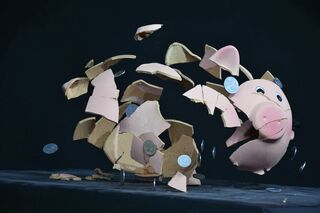Consumer Behavior
Why Consumer Response to High Inflation Matters
Expectations of high inflation lead to dual conflicting consumer impulses.
Posted April 17, 2022 Reviewed by Jessica Schrader
Key points
- Most Americans have never experienced high inflation and are uncertain about how to react.
- Inflation produces two contradictory consumer impulses: to buy before prices go up further and to save.
- Consumer behavior because of high inflation expectations can turn into a self-fulfilling prophecy.
Virtually every expert, from Wall Street analysts and economics professors to Federal Reserve board members, is concerned about inflation. With rising prices and news stories, it’s hardly surprising that consumers’ expectations for future inflation also reached a record high. The latest March survey shows that consumers expect inflation to be 6.6% in a year. The last time inflation was this high in the United States was the early 1980s, meaning that most Americans have never experienced high inflation or its consequences. Many of us are uncertain about how we should react as consumers.
In this post, I want to explore highlights from research about how consumers respond psychologically to high inflation. Studies from previous episodes of high inflation in the U.S. and more recent instances in other countries provide helpful information. In a follow-up post, I will consider the research regarding what consumers should do when inflation is high.
How inflation expectations affect consumer behavior
A well-known psychological principle is that expectations predict behavior. Consumers’ expectations about high future inflation are significant because they potentially influence current buying behavior in two seemingly contradictory ways.
1. When they expect inflation to rise, consumers purchase and stock up on essential items and also durables like appliances and furniture. However, they become less likely to purchase discretionary products and services.
In a seminal 1974 paper that laid the foundation for the consumer psychological study of inflation, George Katona, one of the founding fathers of behavioral economics, explained the relation in this way:
“…when rational people expect prices to go up, those in possession of some liquid funds, or able to borrow, will stock up or hoard at the prevailing lower prices… inflation, a general and sustained increase in the price level, either stimulates or accompanies an increase in consumer demand. In inflationary periods, it is assumed, consumers substitute goods for money and tend to spend more and save less.”
2. They tend to save more money to exercise caution and deal with uncertainty.
Again, in Katona’s words: “At the same time, price increases create uncertainty which leads people to feel a greater need for savings and reserve funds. The rate of saving is therefore expected to increase in inflationary periods.”
Given the obviously contradictory predictions, there is a very large research literature debating which of these effects wins out. The short answer is that it depends on the context, including the inflation rate and the reasons behind it, the labor market, and the Federal Reserve’s response. For instance, Katona himself suggested that when inflation creeps up, consumers tend to postpone buying and save more. But if the expected inflation increase is steep, consumers abandon caution and purchase now at relatively lower current prices. Additionally, you can only save or spend more if you have a cushion in your budget; consumers living paycheck-to-paycheck may not have either option even as they experience higher inflation than the average.
High inflation expectations can become a self-fulfilling prophecy
At present, we see both effects playing out, but they are also affected by other factors like the Ukrainian invasion, supply chain disruptions, the constrained consumer behavior because of the COVID-19 pandemic over the past two years, and the resultant state of consumer finances. Each of these factors has psychological repercussions.

On the one hand, sales of durables like appliances and furniture, not to mention cars and houses, have gone through the roof, just like previous studies have found. At least some of these elevated rates are because of FOMO experienced by potential home-buyers buying now before prices go up even further out of reach. But on the other hand, savings rates are still healthy, though they have come down from the stratospheric levels of the past two years. At least some Americans are saving more money consistently than they used to, partly because of pessimism and concerns about the future.
What does this mean? Elevated buying of appliances, houses, and cars because of high inflation expectations can easily turn into a self-fulfilling prophecy where expectations contribute to creating future reality. Consumers expect inflation to lead to higher future prices, which makes them inclined to make major purchases now, leading to greater demand for these items, which leads companies to raise prices, culminating in higher future inflation. Expectations become a reality, and the vicious cycle goes on.


